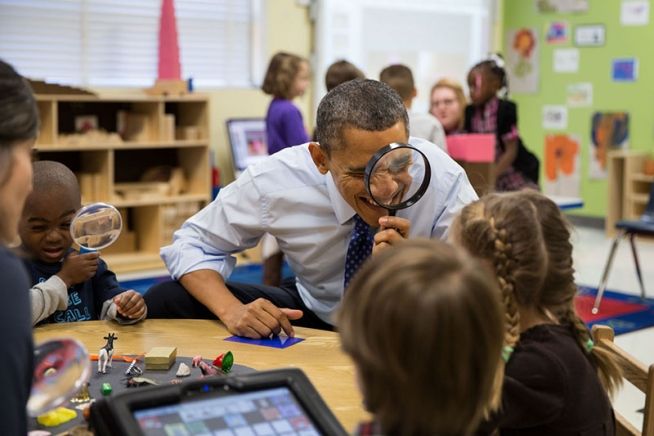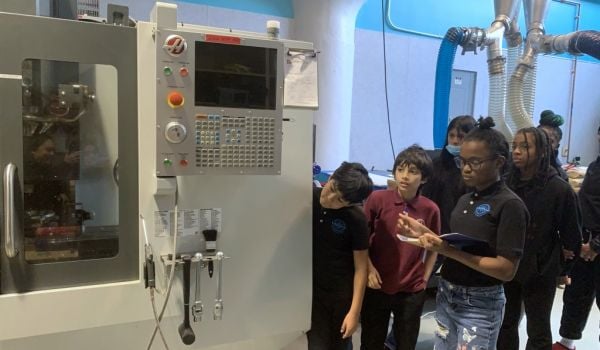President Obama sat at the kiddy table on Thursday, playing with legos and ogling through a magnifying glass. He was in Georgia visiting a preschool to promote his proposal, announced Tuesday night in his State of the Union address, to expand preschool access for low- and middle-income students.
The national plan builds in large part on models pioneered in Pennsylvania and urban areas around the country, going back as far as the 1970s in places such as Ypsilanti, Mich., Milwaukee, Chicago and, most recently, San Antonio. The notion of greater federal support for preschools has particular resonance for urban populations, which have disproportionate high dropout and low literacy rates, both of which correlate to language skills that help children succeed in schools.
Under the president’s proposal, states have to create early learning standards, employ qualified, credentialed teachers in preschool classrooms, limit class size, present rigorous curriculum, and seriously review and evaluate programs. All of these requirements parallel a model developed by former Pennsylvania governor Ed Rendell about a decade ago. Obama’s plan adds health services, salaries for preschool teachers that match those of other grades, and a comprehensive data and assessment system.
Rendell prioritized early childhood education toward the start his administration, creating Pennsylvania’s Office of Child Development and Early Learning, implementing the first state funding for Pre-K, and increasing state funding for Head Start, the federal early childhood support program. Pennsylvania also has an important quality ranking program, called Keystone STARS, that is widely replicated in Obama’s proposal.
“Over the last decade Pennsylvania went from being a state with one of the worst records in childcare to being one of the top 10 in composite rankings,” said Christie Balka of Public Citizens for Children and Youth (PCCY), a Pennsylvania children’s advocacy organization. “Some of the innovations that were introduced in Pennsylvania are models for other states.”
The early education field welcomed the news. W. Steven Barnett, director of the National Institute for Early Education Research, based at Rutgers University, said in a statement that he was “thrilled.” Barnett is a longtime leader in the field of early childhood education, and in 2011 authored a review of studies on the effectiveness of such programs.
“Early educational intervention can have substantive short- and long-term effects on cognition, social-emotional development, school progress, antisocial behavior, and even crime,” wrote Barnett. “A broad range of approaches, including large public programs, have demonstrated effectiveness. Long-term effects may be smaller than initial effects, but they are not insubstantial.”
Obama made his own case Tuesday night. “Every dollar we invest in high-quality early education can save more than $7 later on — by boosting graduation rates, reducing teen pregnancy, even reducing violent crime,” the president said. “In states that make it a priority to educate our youngest children, like Georgia or Oklahoma, studies show students grow up more likely to read and do math at grade level, graduate high school, hold a job and form more stable families of their own.”
But of course the proposal comes at a time of deep partisanship on Capitol Hill, and amid pressure to cut rather than expand government programs. And conservatives are already pushing back. Carrie Lukas, director of the conservative Independent Women’s Forum, called the proposal a “magical fantasy of a preschool student” in Forbes, and questioned the wisdom of further involving the government in education.
The push for universal access to early childhood education will be an uphill battle. Even in Pennsylvania, access to preschool is limited. In Philadelphia, 91 percent of children eligible for Pre-K Counts don’t attend, 51 percent of those eligible for the child care subsidy don’t have it, and 40 percent of children eligible for state and federal Head Start services are not served, according to PCCY. Supply exceeds demand, and in some neighborhoods wait lists drag on for months. In Northeast Philly, wait time for the childcare subsidy is 11 months. That’s a long time for a toddler.

Allyn Gaestel is currently a Philadelphia Fellow for Next City. Much of her work centers on human rights, inequality and gender. She has worked in Haiti, India, Nepal, Mali, Senegal, Democratic Republic of Congo and the Bahamas for outlets including the Philadelphia Inquirer, the Los Angeles Times, Reuters, CNN and Al Jazeera. She tweets @allyngaestel.









